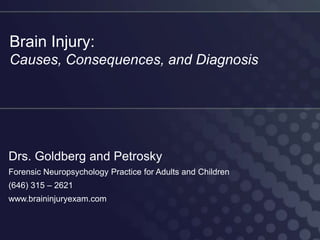
Brain Injury Causes, Consequences, and Diagnosis
- 1. Brain Injury: Causes, Consequences, and Diagnosis Drs. Goldberg and Petrosky Forensic Neuropsychology Practice for Adults and Children (646) 315 – 2621 www.braininjuryexam.com
- 2. What Causes Brain Injury • As you would expect, brain injury is often caused by severe blows to the head as well as other factors, such as ingesting harmful substances. The most common causes of brain injury include: – Slips and falls – Acts of negligence or wrong-doing – Motor vehicle accidents – Accidents at home or work – Defective products – Toxins (e.g. lead paint, carbon monoxide or other noxious gases, contaminated soil) – Sports accidents – Boating accidents
- 3. Consequences of Brain Injury Brain injury can cause pain and suffering, loss of ability to work, loss of companionship, loss of enjoyment of life, and emotional instability. Specifically, a brain injury can impair the following.
- 4. Consequences of Brain Injury • Attention – When a person has trouble focusing for more than brief moments at a time, it can interfere with such basic skills as listening, having a conversation, reading, or completing work in a timely manner. • Executive Functioning – This is a collection of skills that help people plan, organize, control themselves, as well as set and reach goals. Executive functioning deficits can cause problems such as: impaired social skills, a lack of motivation, difficulty thinking, difficulty catching on to new tasks, poor decisions, impulsivity, rigidity (which may look like “stubbornness”), and poor planning and time management.
- 5. Consequences of Brain Injury • Memory – There are many varieties of memory problems, including difficulty learning new things (anterograde amnesia) and/or forgetting what one learned in the past (retrograde amnesia).
- 6. Consequences of Brain Injury • Language – Clinically known as "aphasias," people with brain injury can lose their ability to speak and listen. Sometimes language impairments are dramatic, such as when the person cannot speak and does not comprehend what is said to him or her at all. However, many times the impairment can be more subtle. The person may struggle to find the words he or she is looking for or may use incorrect words. This can make communication slow, laborious, and imprecise as well as cause embarrassment.
- 7. Consequences of Brain Injury • Intelligence – The person may experience a steep drop in verbal, nonverbal, and overall intellectual skills. • Emotional stability – People with brain injury can have difficulty controlling their emotions. They may experience uncontrollable anger or sadness.
- 8. Consequences of Brain Injury • Learning – Certain types of brain injury can impair the person's ability to read, write, and do math. Brain injury in children can dramatically interfere with their school performance. • Motor Skills – Brain injury can impair a person's gross and fine motor skills, such as walking, running, playing sports, using eating utensils or tools, or even putting on clothes.
- 9. Consequences of Brain Injury • Social Skills and Relationships – All of the problems mentioned above can greatly affect a person's ability to establish and preserve friendships and romantic relationships.
- 10. Consequences of Brain Injury • Above are just some of the consequences of brain injury. The brain obviously controls a multitude of functions. Therefore, brain injury, depending on its location in the brain and other factors, can impair a wide range of other skills as well, some of which include the ability to recognize familiar people, enjoy music, taste, and smell. Brain injury can also cause a person to not even recognize that he or she has impairments in the first place, a condition called Anosognosia.
- 11. Posttraumatic Stress Disorder • Whatever caused the brain injury, such as a frightening accident, can also cause severe emotional distress, including Posttraumatic Stress Disorder. Posttraumatic Stress Disorder is a condition in which a person experiences a traumatic event that causes symptoms such as anxiety, tension, nightmares, and on-going fear and avoidance.
- 13. What is a neuropsychological evaluation? • A neuropsychological evaluation identifies the presence, probable cause, severity, and functional consequences of brain injury.
- 14. What is a neuropsychological evaluation? • The examinee completes various tasks that allow the neuropsychologist to measure brain functioning. The tasks include answering questions, memorizing information, paying attention to certain cues, solving puzzles, hands on tasks that involve coordination, and many others.
- 15. What is a neuropsychological evaluation? • The results provide factual data that allow the neuropsychologist to quantify a person's skills in areas such as attention, executive functioning, memory, language, intelligence, reading, writing, math, emotional control, motor functioning, and many other areas.
- 16. For More Information Please contact the Forensic Neuropsychology Practice of Drs. Goldberg and Petrosky (646) 315 - 2621